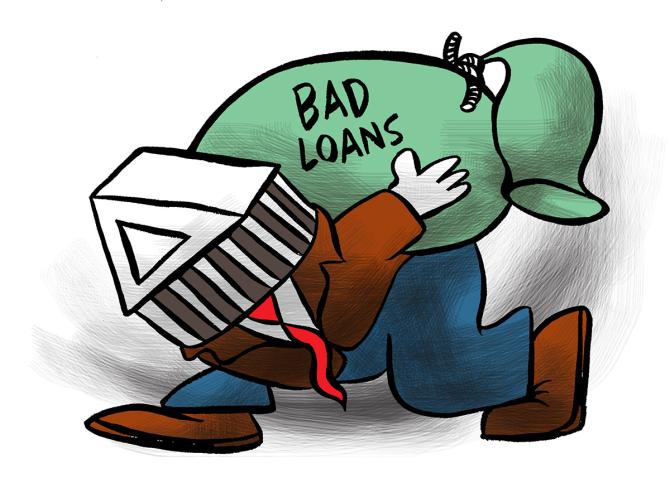Banks are set to sell dud-loans worth Rs 90,000 crore of 22 firms in the first tranche to the National Asset Reconstruction Company (NARCL).

It’s reason for cheer given that such sales to asset reconstruction companies (ARCs) have been poor in recent times.
In fiscal 2020, their assets under management (AUM) contracted by 4 per cent; and in fiscal 2021, it fell by another 100 basis points to Rs 1.07 trillion.
So, why are we where we are?
“In FY21, we sold nine out of 10 assets for cash.
"This year (FY22) too, whatever we have sold (20-23 assets) if for cash.
"We have taken security receipts (SRs) only in 3-4 cases.
"Selling in cash entails higher haircuts, but we are okay with that,” says Swaminathan J, managing director (risk, compliance & stressed assets resolution group) at the State Bank of India.
Two other factors have also been in play.
“The requirement of investment by ARCs was zero to begin with.
"Then the Reserve Bank of India (RBI) came with the 5:95 scheme (ARCs’ share at 5 per cent to be paid in cash by them to banks; and the rest in SRs issued to banks).
"When the RBI introduced the 15:85 rule, it meant that the capital needs of ARCs went up,” says R K Bansal, managing director and chief executive officer at Edelweiss Asset Reconstruction Company. Yes, even ARCs may have to put in more equity into this business going ahead.
“We have also not seen new capital coming into ARCs to help them in terms of leverage”, adds Swaminathan.
The other aspect was technical.
On September 1, 2016, the RBI introduced progressive provisioning for banks’ SR-based deals.
It imposed a floor (in percentage) for provisioning in cases where the investment by a bank in SRs was more than 50 per cent; and this was reduced to 10 per cent from April 1, 2018.
“This made the circular applicable to majority of the loan sales to ARCs.
"Consequently, banks had to provide for similar provisioning, assuming that the loans continued to be notionally on their books,” notes Nikhil Shah, managing director at Alvarez & Marsal (India).
He adds: “The incentive of minimising provision during sale to ARCs did not exist post-FY19 which may have led to a decrease in bad loan sales to ARCs.
"Finally, as banks did not have the benefit on account of sale, they may have started demanding higher upfront cash resulting in lower issuance of proportionate SRs.”
What now?
There’s no denying that we may be on the cusp of big bad-loan transfers to the NARCL.
And not just because that the Centre has guaranteed the SRs issued by the NARCL when it buys bad loans from lenders.
It may have more to do with the fact that the Centre may not indulge state-run banks anymore by recapitalising them as in the past.
As recently as on September 25, Finance Minister Nirmala Sitharaman, said: “Banks (state-run) should raise funds from the markets for their growth rather than depend on the government for recapitalisation.”
This reiteration was important.
In the aftermath of the RBI’s asset quality review, “state-run banks (in particular) were comfortable in declaring NPAs, and making provisions because the government was giving equity.
"And this also led to a decline in sales by the banking system under 15:85”, explains Bansal.
The Report of the Committee to Review the Working of ARCs (November 2, 2021) says that the performance of ARCs has been lackluster (and this is outside of the fall in the AUMs of ARCs).
For both, in terms of ensuring recovery and revival of businesses, banks and other investors could recover only about 14.29 per cent of the amount owed by borrowers in respect of stressed assets sold to ARCs during 2004-2013.
And nearly 80 per cent of the recoveries made by ARCs have come through deployment of measures of reconstruction that don’t necessarily lead to a revival of businesses.
In this context, the recommendation of the Committee that lenders be allowed to sell stressed assets at an earlier stage to allow for optimal recovery by ARCs becomes important.
Also, it recommends that there needs to be regulatory clarity on sale of all categories of special mention accounts to ARCs; and loss, if any, to be amortised, over a period of two years.
Another trend that is seen raising its head is that ARCs may have sharpened their strategy on the kind of bad assets they acquire, more so with the big-ticket NPAs of Rs 500 crore and above, going to the NARCL.
“In the retail and MSME (micro, small, and medium enterprises) segments, ARCs have the opportunity to create niches.
But these segments need an operationally intensive set-up that other investor classes are unlikely to be interested in creating,” says Krishnan Sitaraman, senior director and deputy chief ratings officer at CRISIL Ratings.
Also, during FY17-FY21 acquisition of bad loans from non-banking financial companies (NBFCs) grew at a compounded annual rate of 87.9 per cent; in fact, they were the largest supplier of stressed assets among the eligible entities.
“One of the factors may be that, after its initial notification in FY17, the Centre has been notifying an increasing number of NBFCs as financial institutions (FIs).
"At present, all NBFCs having asset size of Rs 100 crore and above, are notified as FIs.
"The liquidity crunch faced by NBFCs around FY19, too, would have pushed them to increase encashment of financial assets at a steeper discount; and a reduction in the book-value implies lower gross SRs,” points out Shah.
What’s not clear is how banks will tackle new NPAs.
The RBI committee feels that if aggregation of bad-loans is to improve, the voting threshold by lenders is to be cut to 66 per cent from 75 per cent (this will align it with the Insolvency and Bankruptcy Code’s floor).
That brings the three-year old inter-creditor agreement over which banks are still divided, into play again.
All said, a new construct is in the offing, though in the bad-loan market.












 © 2025
© 2025